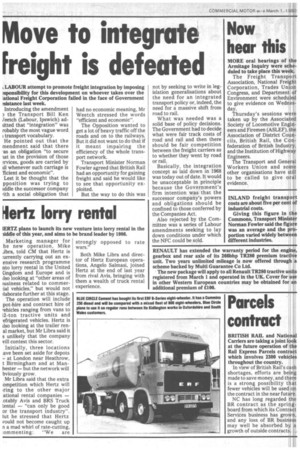Move to integrate Freight is defeated
Page 6

If you've noticed an error in this article please click here to report it so we can fix it.
LABOUR attempt to promote freight integration by imposing .Isponsibility for this development on whoever takes over the rational Freight Corporation failed in the face of Government sistance last week.
Introducing the amendment ) the Transport Bill Ken Teetch (Labour, Ipswich) adiitted that "integration" was robably the most vague word [transport vocabulary.
He pointed out that the mendment said that there as an obligation "to secure tat in the provision of those !rvices, goods are carried by dl whenever such carriage is Ticient and economic".
Lest it be thought that the pposition was trying to iddle the successor company rith a social obligation that had no economic meaning, Mr Weetch stressed the words "efficient and economic".
The Opposition wanted to get a lot of heavy traffic off the roads and on to the railways. But it did not want to do that if it meant impairing the efficiency of the whole transport network.
Transport Minister Norman Fowler agreed that British Rail had an opportunity for gaining freight and said he would like to see that opportunity exploited.
But the way to do this was not by seeking to write in legislation generalisations about the need for an integrated transport policy or, indeed, the need for a massive shift from road to rail.
What was needed was a solid base of policy decisions. The Government had to decide what were fair track costs of road and rail and then there should be fair competition between the freight carriers as to whether they went by road or rail.
Basically, the integration concept as laid down in 1968 was today out of date. It would be unacceptable in principle because the Government's firm intention was that the successor company's powers and obligations should be confined to those conferred by the Companies Act.
Also rejected by the Committee was a series of Labour amendments seeking to lay down conditions under which the NFC could be sold.
















































































































